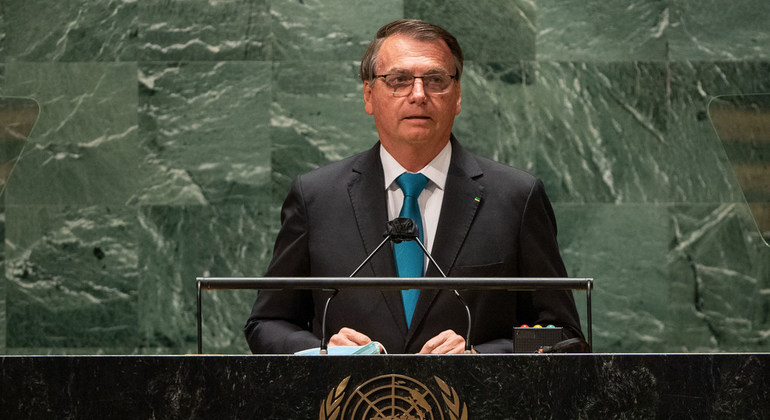“We anticipated, from 2060 to 2050, the goal of achieving climate neutrality. Human and financial resources, destined to the strengthening of environmental agencies, were doubled, with a view to eliminating illegal deforestation,” he said.
Mr. Bolsonaro was speaking at UN Headquarters at the opening of the high-level week of the General Assembly. After being held virtually last year due the coronavirus pandemic, this year’s gathering will feature “hybrid” activities that will include leaders in person along with virtual participants. Brazil has opened the debate since 1955.
An example on environment and climate action
For the Brazilian President, the results of this action on climate “have already started to appear.” In the Amazon, he pointed to a 32 per cent reduction in deforestation in the month of August, when compared to the same month last year.
He introduced the country as “an example in energy generation”, with 83 per cent coming from renewable sources, and said he would we will seek consensus on the rules of the global carbon credit market at the COP26, the UN Climate Conference that starts at the end of October in Glasgow.
“We expect industrialized countries to effectively meet their climate finance commitments in relevant volumes,” Mr. Bolsonaro said.
He recalled that his country’s agriculture sector feeds more than 1 billion people in the world, using only 8 per cent of the national territory, and assured that “no country in the world has such complete environmental legislation.”
“Our Forest Code must set an example for other countries,” he said.
He recognized the country faces “great environmental challenges”, being a nation of continental dimensions. The Amazon region alone is equivalent to the area of the whole of Western Europe
For him, “the future of green jobs is in Brazil: renewable energy, sustainable agriculture, low-emission industry, basic sanitation, waste treatment and tourism.”
He also remembered than 14 per cent of the national territory, an area equivalent to Germany and France together, is destined to indigenous reserves. “In these regions, 600,000 Indians live in freedom and increasingly want to use their land for agriculture and other activities,” he said.
Pandemic and jobs
As of 20 September, there have been more than 21 million confirmed cases of COVID-19 in Brazil. With 590,508 deaths reported to WHO, the number is only second to the United States.
Mr. Bolsonaro said that “the pandemic took everyone by surprise in 2020” and that his administration “regrets all the deaths that occurred in Brazil and in the world.”
He said he “always defended fighting the virus and unemployment simultaneously and with the same responsibility” and pointed to “isolation and lockdown measures” that have “left a legacy of inflation, particularly in foodstuffs around the world.”
As of 17 September, according to numbers reported to WHO, more than 207 million doses have been administered in Brazil, meaning more than 66% of the population has received at least one shot.
Mr. Bolsonaro assured that, until November, everyone who chose to be vaccinated in Brazil will be assisted.
Peacekeeping and refugees
On international affairs, the Head of State remembered his country’s participation in UN peacekeeping missions, from Suez to Congo, passing through Haiti and Lebanon.
He said Brazil “has always welcomed refugees” and mentioned the 400,000 Venezuelans the country has received in the last few years. Showing “deep concern” for the future of Afghanistan, he assured Brazil “will grant humanitarian visas to Afghan Christians, women, children and judges.”
In 2022, the South American nation will again occupy a seat on the UN Security Council, having been elected by 181 countries earlier this year for a two-year term as a non-permanent member.
Despite this presence, Mr. Bolsonaro concluded his speech saying his country supports a reform of the Council and seeks a permanent seat.
